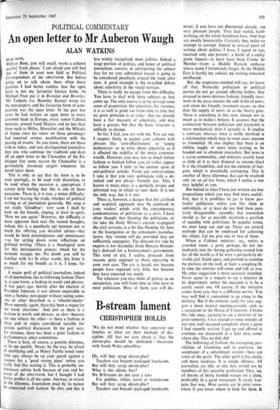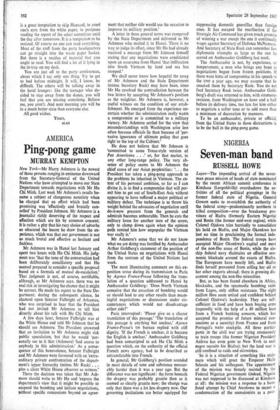An open letter to Mr Auberon Waugh
POLITICAL COMMENTARY
ALAN WATKINS
DEAR BRON,
William Boot, you will recall, wrote a column entitled 'Lush places.' I am afraid you will find few of them in your new field as Political Correspondent of the SPECTATOR. But before going on to talk about these often dusty pastures I had better confess that the open letter is not my favourite literary form. As Michael Foot put it in Brendan and Beverley, `Mr Tadpole (i.e. Beverley Baxter) wrote for the newspapers, and his favourite form of com- position was the open letter. In the past few years he had written an open letter to every crowned head in Europe, every senior Cabinet minister, several Lord Mayors and no less than three each to Hitler, Mussolini and the Mikado of Japan since his views on these personages had required serious modification with the passing of events.' As you know, there are those with us today, and very distinguished journalists they are, who continue the tradition and dash off an open letter to the Chancellor of the Ex- chequer (for some reason the Chancellor is a particularly favoured target) whenever the mood takes them.
This is only to say that the form is to be used sparingly, to be used with discretion, to be used when the occasion is appropriate. I cannot help feeling that this is one of those occasions. There is, it is true, a minor difficulty.
am not leaving the trade, whether of political writing or of journalism generally. My song is not really 'Goodbye': very soon I shall be back on the boards, singing, at least in spirit, `Here we are again.' However, the difficulty is more apparent than real. On second thoughts, indeed, this is a peculiarly apt moment not so much for offering you detailed advice—that would be both presumptuous and unnecessary —as for setting down some reflections on political writing. (There is a theological term for this introspective process which for the Moment escapes me. No doubt you will be familiar with it.) In other words, this 'letter is as much for my benefit as it is, I hope, for yours.
A major peril of political journalism, indeed of all journalism, lies in following fashion.There is, as you know, a fashion in words and phrases. A few years ago, shortly after the election of President Johnson, it was almost impossible to open a Sunday newspaper without seeing some- one or other described as a 'wheeler-dealer.' More recently, again, there has been a vogue for the word 'charisma.' And just as there is a fashion in words and phrases, so also—because the one infects the other—is there a fashion in Ideas and in topics considered suitable for serious political discussion. In the past year, for instance, there has been a great fashion in parliamentary select committees.
There is 'here, of course, a genuine dilemma, so let me qualify. Never, by the way, be afraid of qualifying and, as Henry Fairlie noted some time ago, always be on your guard against a request for a 'good strong piece' unless you really feel like writing it. This is probably un- necessary advice both because of you and be- cause of the SPECTATOR, but I thought I had better proffer it all the same. Anyway, to return to the dilemma. Journalism must by its nature be concerned with fashion. So also, and this is
less widely recognised, must politics. Indeed a large portion of politics, and hence of political journalism, consists in anticipating the subject that for no very substantial reason is going to be considered peculiarly crucial the week after next. A good example is the so-called debate about selectivity in the social services.
There is really no escape from this difficulty. You have to deal with these subjects as they come up. The only course is to try to keep some sense of proportion. On selectivity, for instance, it is as well to point out from time to time that no great principle is at stake: that we already have a fair measure of selectivity, and may have a greater, but that the basic structure is unlikely to change.
So far, I feel, you are with me. You are not, I suspect, likely to pepper your column with phrases like 'cost-effectiveness' or 'young technocrats' or to write about selectivity as if it affected the stability of the entire common- wealth. However, you may not so much follow fashion as fashion follow you, or rather appear to follow you. I refer to the current spate of anti-political articles. From our conversations I take it that you view politicians with a de- tached and not always friendly eye. This, I hasten to make clear, is a perfectly proper and informed way in which to view them. It is not the only way, but it is one.
There is, however, a danger that this civilised and sceptical approach may be confused in your readers' minds with the contemporary condemnations of politicians as a clasS. I have often thought that blaming the politicians, or (to take the Daily Mirror's current scapegoat) the civil servants, is a bit like blaming the Jews or the bourgeoisie or the armaments manufac- turers. Any victims will do, provided they are sufficiently unpopular. The demand for rule by experts is not dissimilar from Horatio Bottom- ley's demand for a businessmen's government. This kind of cry, I realise, proceeds from reasons quite opposed to those operating in your own case. The cry is heard, not because people have expected very little, but because they have expected too much.
Yet whatever you may think of politics as an occupation, you will from time to time have to meet politicians. Most of them, you will dis- ' cover, if you have not discovered already, are very pleasant people. They lead useful, hard- working, on the whole humdrum lives. And they are mostly honourable. Certainly they make no attempt to corrupt. Indeed in several years of writing about politics I have, I regret to say, received only one present : a bottle of a sticky green liqueur—it must have been Creme de Menthe—from a Middle Eastern embaisy whose name I fortunately forget. As the Middle East is hardly my subject, my writing remained unaffected.
But, the suspicious-minded will say, we know all that. Naturally politicians or political
parties do not go around offering bribes; they proceed in more devious fashion; friendly treat- ment in the press secures the odd tit-bit of news; and when the friendly treatment ceases, so also does the supply of news; or so the theory goes. There is something in this view, though not as much as its holders believe. It assumes that the connection between politician and journalist is more mechanistic than it actually is. It implies a contract, whereas what is really involved is a relationship which may in some cases amount to friendship. (It also implies that there is an infinite supply of news items waiting to be handed out to obedient journalists. But news is a scarce commodity, and ministers usually have as little of it at their disposal as anyone else.) It is the friendship, and not the element of bar- gain, which is potentially corrupting. This is another of those dilemmas that can be resolved only on an ad hoc basis, which I realise is not very helpful to you.
But buried in what I have just written are two propositions which you may find more useful: first, that, it is profitless to get to know par- ticular politicians unless you like them as individuals, or at least do not find them posi- tively disagreeable: secondly, that journalists should as far as possible maintain a position of equality with politicians. In popular terms, we must keep our end up. There are several methods that can be employed for achieving this object. Let me give one or two of them.
When a Cabinet minister, say, enters a crowded room, a party perhaps, do not im- mediately join the throng gathering around him for all the world as if he were a particularly de- sirable girl. Stand apart, and pretend to examine the pictures on the wall, or have a coughing fit. In time the minister will come and talk to you. My other suggestion is more seriously intended. Never agree to a request to see a minister in his department, unless the occasion is to be a purely social one. Of course, if the initiative comes from you, that is a different matter. You may well find it convenient to go along to the ministry. But if the minister sends for you, sug- gest a more neutral meeting-ground, such as a restaurant or the House of Commons. I broke this rule once, agreeing to see a minister of no great seniority. I was treated to some minutes of not very well reasoned complaint about a piece I had recently written. I got up and offered to continue our discussion at a later date some- where else. This we duly did.
The following of fashion, the corrupting pos- sibilities of friendship and its converse, the acceptance of a subordinate station—these are some of the perils. The other peril is less exotic and more insidious. It is simple idleness. All journalists are idle, or else they would not be members of this anarchic profession. They, we, all dream of being handed scoops on a plate, preferably in a good restaurant. It rarely hap- pens that way. Most secrets are in print some- where if you know where to look for them. It is a great temptation to skip Hansard, to avert one's eyes from the white paper, to postpone reading the report of the select committee until the day after tomorrow. It is a temptation to be resisted. Of course no one can read everything. Most of the stuff from the party headquarters can go straight into the waste paper basket. But there is a residue of material that you ought to read. You will find a lot of it lying in the in-tray on my desk.
You are just off to the party conferences, about which I say only one thing. Try to get to bed before midnight. It will, I know, be difficult. The others will be talking away in the hotel lounges: like the teenager who de- cided to stay away from the dance, you will feel that you are missing something. Believe me, you aren't. And next morning you will be in a much better state than everyone else.
All good wishes. Yours,
ALAN







































 Previous page
Previous page